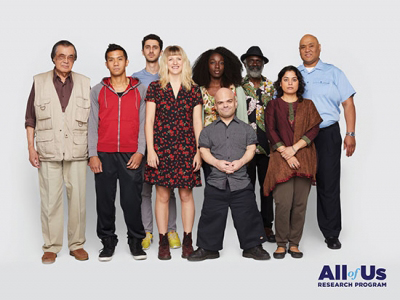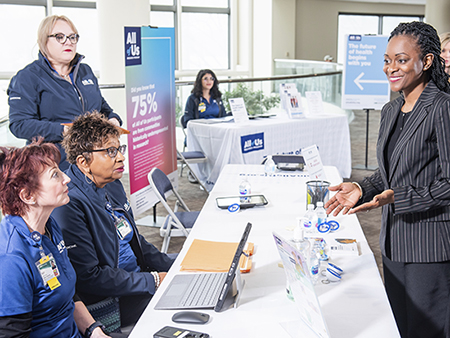 Recruiting participants to a research program is one thing. Keeping those participants engaged over time is another. Investigators at the University of Alabama at Birmingham, which heads the Southern Network of the National Institutes of Health’s All of Us Research Program, will launch a new pilot study aimed at increasing participant retention rates in All of Us in the state of Alabama.
Recruiting participants to a research program is one thing. Keeping those participants engaged over time is another. Investigators at the University of Alabama at Birmingham, which heads the Southern Network of the National Institutes of Health’s All of Us Research Program, will launch a new pilot study aimed at increasing participant retention rates in All of Us in the state of Alabama.
All of Us is a national program to accelerate health research and medical breakthroughs, enabling individualized prevention, treatment and care for all of us. The overall aim nationally is to enroll 1 million or more volunteers who will provide information over time for use in a wide range of health research studies. The program will oversample communities that have been underrepresented in biomedical research to make the program’s dataset the largest, most diverse resource of its kind.
Launched in May 2018, All of Us has enrolled more than 270,000 participants nationwide. The Southern Network, consisting of Alabama, Mississippi and Louisiana, has enrolled more than 17,700.
UAB investigators, funded by an additional $7 million funding award from NIH, will conduct a pilot study to discover better ways to engage and retain those enrollees. UAB will share lessons learned from this pilot with other All of Us partners to support retention efforts nationwide, particularly with other rural and hard-to-reach communities.
“Retaining research participants over the course of a multiple-year study can be difficult, especially in a large, multifaceted program such as All of Us,” said Bruce R. Korf, M.D., Ph.D., UAB chief genomics officer and co-principal investigator for the All of Us Southern Network. “The goal of this pilot study will be to assess retention models even as we continue enrollment efforts throughout the three-state Southern Network.”
The pilot will employ a retention navigator model, using specially trained navigators to interact directly with participants. Navigators will be recruited locally in areas where access to UAB or the other study sites is a barrier to recruitment and retention.
“Individuals may be more likely to remain involved in the program if they can relate to trusted ‘retention navigators,’ who can help them to understand and interact with All of Us and overcome barriers such as lack of internet or email access or fear of research studies,” said Mona Fouad, M.D., director of the UAB Minority Health and Health Disparities Research Center.
 The program will be utilizing a mobile clinical unit to reach remote areas, eliminating the need for participants to travel to UAB or one of the other study sites. The investigators will also assess the efficacy of traditional and new digital retention strategies.
The program will be utilizing a mobile clinical unit to reach remote areas, eliminating the need for participants to travel to UAB or one of the other study sites. The investigators will also assess the efficacy of traditional and new digital retention strategies.
“Use of enhanced digital and traditional retention techniques can improve participant engagement and increase the likelihood of follow-up by creating stronger and more frequent connections to the program,” said Cora E. Lewis, M.D., chair of the Department of Epidemiology in the School of Public Health and co-PI of the Southern Network.
The pilot will identify and engage health care providers, community leaders and community organizations in the target areas to assist in the identification and recruitment of navigators, and then recruit retention navigators in those targeted areas. Investigators hope to increase study retention by assisting participants in completing follow-up surveys online through the All of Us participant portal.
“Recruitment and retention of participants in clinical research is the key to finding the answers that can be transformative for the overall health of our state and region,” said Selwyn Vickers, M.D., senior vice president and dean of the UAB School of Medicine. “I applaud the leadership and staff of the Southern Network for their outstanding efforts thus far. I am confident that they will discover and fine-tune new strategies for keeping those who selflessly give of themselves to participate in All of Us active and engaged over the course of the research project.”
Alabamians age 19 or older, regardless of health status, are eligible to enroll in the program by visiting JoinAllofUs.org/UAB.
The All of Us Southern Network includes the University of Alabama at Birmingham, Cooper Green Mercy Health Services, Huntsville Hospital, Louisiana State University Health Sciences Center, Tulane University, Tuskegee University, UAB School of Medicine’s Montgomery Internal Medicine and Selma Family Medicine programs, UAB School of Medicine’s Huntsville Regional Medical Campus, University of Mississippi Medical Center, University of South Alabama Health System, and University Medical Center in Tuscaloosa.
The All of Us Southern Network is supported under NIH funding award #1OT2OD026548. “All of Us” is a registered service mark of the U.S. Department of Health and Human Services.